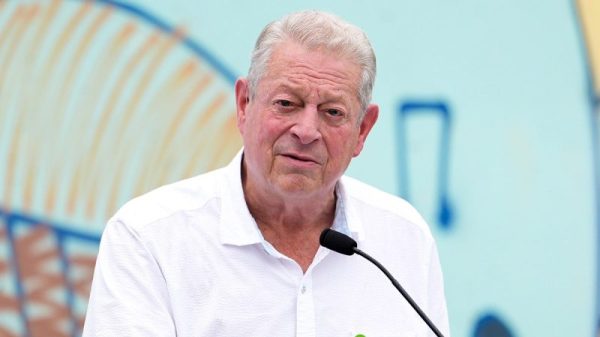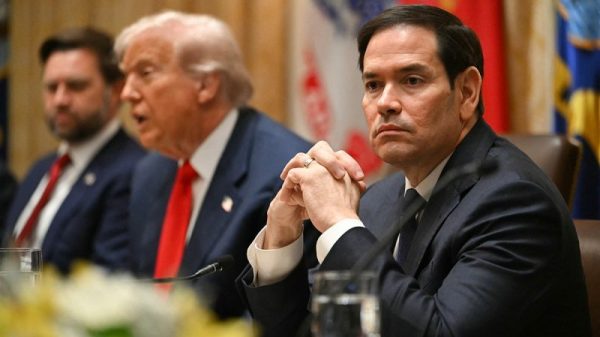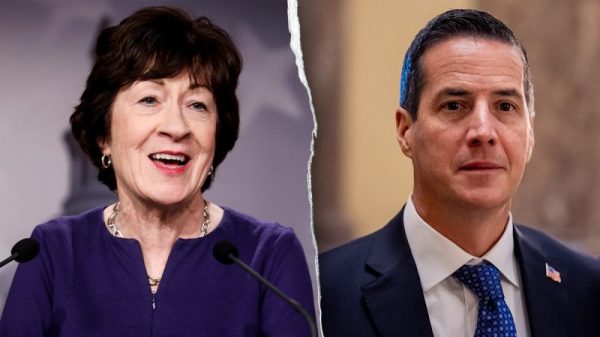The Justice Department on Wednesday announced the arrest of a former Google AI engineer, alleging he stole information about the company’s advanced technologies while planning to set up his own company in China.
Leon Ding, or Linwei Ding, a 38-year-old Chinese national, was detained in Newark, Calif., and charged with four counts of trade secret theft.
Justice Department officials called the case a signal that the U.S. government will remain vigilant against attempts to illicitly transfer advanced U.S. technologies to China, amid a Cold War-like technological arms race between Washington and Beijing.
“The Justice Department will not tolerate the theft of artificial intelligence and other advanced technologies that could put our national security at risk,” U.S. Attorney General Merrick Garland said in a statement.
If convicted, Ding faces a maximum penalty of 10 years in prison and up to $1 million in fines.
According to an indictment filed March 5 in federal court in San Francisco, Ding was hired by Google as a software engineer in 2019 and worked on the company’s supercomputing data centers. He worked on developing software that helped the operation of machine learning and AI applications for Google’s clients, the indictment said.
Prosecutors said that Ding began uploading confidential Google information to a personal Google Cloud account in May 2022 and had uploaded more than 500 files containing Google confidential information by May 2023.
The trade secret theft counts involve chip architecture and software design specifications for “tensor processing units” and “graphics processing units,” chips that are the building blocks of supercomputing centers.
While still employed at Google, Ding became the chief technology officer of a China-based AI company, Beijing Rongshu Lianzhi Technology Co., and founded a second China-based company, Shanghai Zhisuan Technology Co., without informing Google of his positions at either company, the indictment said.
The FBI searched Ding’s residence on Jan. 6, seizing his electronic devices and other evidence.
“Let today’s announcement serve as further warning: Those who would transfer sensitive U.S. technology to China risk finding themselves on the wrong end of a criminal indictment,” Assistant Secretary Matthew Axelrod of the Commerce Department’s Office for Export Enforcement said in a statement.
The Justice Department said the investigation into Ding was carried out by the Justice and Commerce Departments’ Disruptive Technology Strike Force, a year-old group aimed at securing U.S. technologies from being acquired by “authoritarian regimes and hostile nation-states.”
Both the U.S. and Chinese governments view artificial intelligence as a strategic emerging technology with broad potential to boost economic output in civilian sectors, while also providing key capabilities for militaries and intelligence agencies. President Biden issued an AI executive order last year aimed at keeping the United States ahead of countries like China in AI development.
Ding, Beijing Rongshu Lianzhi Technology and Shanghai Zhisuan Technology could not be immediately reached for comment.
Google spokesperson José Castañeda said Google had referred the case to federal officials. “We have strict safeguards to prevent the theft of our confidential commercial information and trade secrets. After an investigation, we found that this employee stole numerous documents, and we quickly referred the case to law enforcement,” he said.
Gerrit De Vynck contributed.
The Justice Department on Wednesday announced the arrest of a former Google AI engineer, alleging he stole information about the company’s advanced technologies while planning to set up his own company in China.
Leon Ding, or Linwei Ding, a 38-year-old Chinese national, was detained in Newark, Calif., and charged with four counts of trade secret theft.
Justice Department officials called the case a signal that the U.S. government will remain vigilant against attempts to illicitly transfer advanced U.S. technologies to China, amid a Cold War-like technological arms race between Washington and Beijing.
“The Justice Department will not tolerate the theft of artificial intelligence and other advanced technologies that could put our national security at risk,” U.S. Attorney General Merrick Garland said in a statement.
If convicted, Ding faces a maximum penalty of 10 years in prison and up to $1 million in fines.
According to an indictment filed March 5 in federal court in San Francisco, Ding was hired by Google as a software engineer in 2019 and worked on the company’s supercomputing data centers. He worked on developing software that helped the operation of machine learning and AI applications for Google’s clients, the indictment said.
Prosecutors said that Ding began uploading confidential Google information to a personal Google Cloud account in May 2022 and had uploaded more than 500 files containing Google confidential information by May 2023.
The trade secret theft counts involve chip architecture and software design specifications for “tensor processing units” and “graphics processing units,” chips that are the building blocks of supercomputing centers.
While still employed at Google, Ding became the chief technology officer of a China-based AI company, Beijing Rongshu Lianzhi Technology Co., and founded a second China-based company, Shanghai Zhisuan Technology Co., without informing Google of his positions at either company, the indictment said.
The FBI searched Ding’s residence on Jan. 6, seizing his electronic devices and other evidence.
“Let today’s announcement serve as further warning: Those who would transfer sensitive U.S. technology to China risk finding themselves on the wrong end of a criminal indictment,” Assistant Secretary Matthew Axelrod of the Commerce Department’s Office for Export Enforcement said in a statement.
The Justice Department said the investigation into Ding was carried out by the Justice and Commerce Departments’ Disruptive Technology Strike Force, a year-old group aimed at securing U.S. technologies from being acquired by “authoritarian regimes and hostile nation-states.”
Both the U.S. and Chinese governments view artificial intelligence as a strategic emerging technology with broad potential to boost economic output in civilian sectors, while also providing key capabilities for militaries and intelligence agencies. President Biden issued an AI executive order last year aimed at keeping the United States ahead of countries like China in AI development.
Ding, Beijing Rongshu Lianzhi Technology and Shanghai Zhisuan Technology could not be immediately reached for comment.
Google spokesperson José Castañeda said Google had referred the case to federal officials. “We have strict safeguards to prevent the theft of our confidential commercial information and trade secrets. After an investigation, we found that this employee stole numerous documents, and we quickly referred the case to law enforcement,” he said.
Gerrit De Vynck contributed.





















